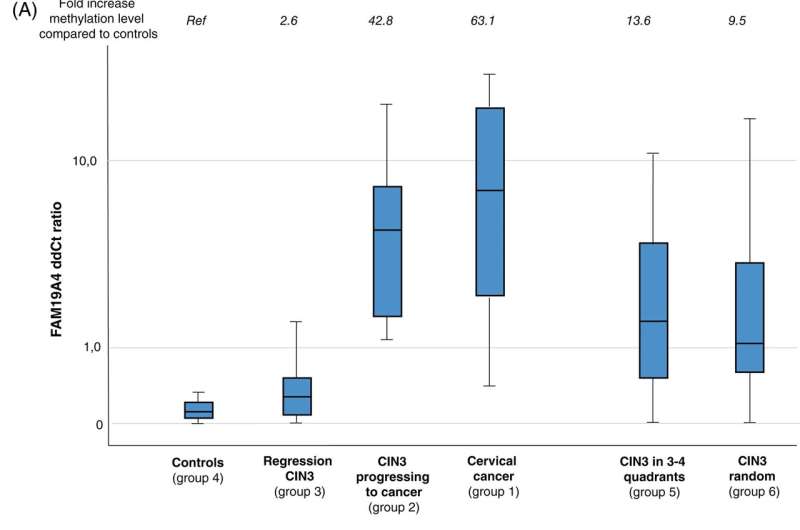This article has been reviewed according to Science X's editorial process and policies. Editors have highlighted the following attributes while ensuring the content's credibility:
fact-checked
peer-reviewed publication
proofread
Exploring better care for pregnant women with precancerous cervical cancer

Preliminary stages of cervical cancer occur mainly in women between 25 and 35 years of age. The main risk factor for developing cervical cancer is the human papillomavirus (HPV). Surgery is the treatment of choice. However, such an operation is problematic for pregnant women: since a piece of the uterus is removed, the risk of bleeding and premature birth increases because the cervix shortens and is no longer stable enough. For this reason, affected women have so far had to come for check-ups several times during pregnancy.
A new type of screening test performed via the cervix could improve the treatment of affected women in the future. A study involving researchers from the Comprehensive Cancer Center (CCC) of the Hannover Medical School (MHH) used so-called methylation tests to monitor the progression of precancerous lesions on the cervix. Methylation values provided information on the severity of the precancerous stage.
"The test can help us to care for affected women conservatively until after delivery, i.e., not to operate on the cervix of pregnant women, but instead to monitor them and, if necessary, treat them after delivery," explains Professor Dr. Peter Hillemanns, Director of the Department of Obstetrics and Gynecology at MHH. The results were published in the International Journal of Cancer.
Severity of precancer is related to methylation
Methylation deactivates the tumor suppressor genes, colloquially known as "tumor suppressor genes." Methylation acts like a cap that sits on top of the genetic material and blocks the gene. The HP virus thus has an easy game and can drive cancer development. The study looked at the methylation markers MFAM19A4 and miR124-2. A screening test was done in 127 women with and without pre-cancerous cervical disease. The test showed low levels of methylation in those with unremarkable findings or precancerous lesions that regressed. On the other hand, high methylation levels were found in pre-cancerous lesions or cancer that had progressed.
"With the help of the test, we can be sure at low levels that the likelihood of the precancer developing into cancer, or cancer hidden somewhere, is extremely low," explains Hillemanns. "This supports us in the care of the patients."
Nonpregnant women also benefit from the test
Especially for young women who may not yet have started or completed their family planning, a conventional operation would have unpleasant consequences due to the increased risk of premature birth. However, with such a test, precancerous lesions could be monitored well.
"There are already test procedures that can be used in routine care," says Hillemanns. "However, we still need to gather more experience. Then we want to evaluate the tests as part of the guideline for the prevention of cervical cancer."
More information: Monika Hampl et al, Evaluation of FAM19A4/miR124‐2 methylation performance in the management of CIN3 diagnosed pregnant women, International Journal of Cancer (2022). DOI: 10.1002/ijc.34153



















